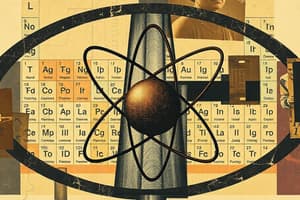Podcast
Questions and Answers
Explain the role of atomic number and mass number in relation to the periodic table.
Explain the role of atomic number and mass number in relation to the periodic table.
Atomic number determines the element's identity and is equal to the number of protons. Mass number is the sum of protons and neutrons in the nucleus.
Discuss the types of chemical bonds that Chemistry 12th students will explore and their impact on substance properties.
Discuss the types of chemical bonds that Chemistry 12th students will explore and their impact on substance properties.
Students will learn about covalent, ionic, and coordinate covalent bonds. These bonds affect properties like melting point, boiling point, and conductivity.
How do reversible reactions relate to the concept of equilibrium in Chemistry?
How do reversible reactions relate to the concept of equilibrium in Chemistry?
In reversible reactions, products can react to form reactants again. At equilibrium, the rates of the forward and reverse reactions are equal.
In 12th Class Chemistry, students uncover the properties of solutions and how they can be used to determine factors like the concentration of solutes, the formation of complex ions, and the concentration of non-volatile particles. This falls under the topic of _____________ Chemistry.
In 12th Class Chemistry, students uncover the properties of solutions and how they can be used to determine factors like the concentration of solutes, the formation of complex ions, and the concentration of non-volatile particles. This falls under the topic of _____________ Chemistry.
In 12th Class Chemistry, students explore the principles of thermodynamics, including enthalpy, entropy, and Gibbs free energy. This topic is known as ______________ and ______________.
In 12th Class Chemistry, students explore the principles of thermodynamics, including enthalpy, entropy, and Gibbs free energy. This topic is known as ______________ and ______________.
In 12th Class Chemistry, students learn about the role of chemistry in understanding and addressing environmental issues, including the causes and effects of air, water, and soil pollution. This area of study is referred to as ____________ Chemistry.
In 12th Class Chemistry, students learn about the role of chemistry in understanding and addressing environmental issues, including the causes and effects of air, water, and soil pollution. This area of study is referred to as ____________ Chemistry.
Study Notes
Chemistry 12th: Exploring the Subtopics
As you embark on your Chemistry 12th journey, we'll delve into the fascinating world of atomic structure, chemical bonding, and the intricacies of the periodic table. In this article, we'll also highlight the recently emerging trend of Bing Chat's new feature, allowing you to skip web search results when seeking specific knowledge, and we'll cover a related term that's relevant to other contexts.
Bing Chat's "No Search" Feature
Bing Chat will soon offer a feature to exclude web search results when answering your questions, like in coding or math. This innovation, dubbed "#nosearch," will be particularly helpful when you're looking for a specific fact instead of general information.
Catalog Items Marked as No Search
In a different but related context, the ServiceNow Knowledge Base explains that a "No Search" checkbox can prevent certain catalog items from being visible on the portal and also from being searchable. This feature can be used to control the visibility of confidential or sensitive items.
The "No Search" Field in Typo3
The "no_search" field is also relevant in the context of web development. For instance, a project on GitHub details a suboptimally chosen field to exclude pages from a sitemap. This field is used to exclude pages from SEO indexing.
The "No Search For" Chrome Extension
A Chrome extension called "No Search For" removes the "People also searched for" box on Google search results to make navigation more predictable. This extension is useful if you find the box distracting or want to avoid additional search results.
Now that we've covered the latest news and a bit of background on the term "no search," let's dive into the specific content you'll encounter in your Chemistry 12th classes.
Atomic Structure
Chemistry 12th students will explore the organization of matter, starting from the concept of atoms. They'll discover the structure of the atom, including the nucleus, protons, neutrons, and electrons. They'll learn about atomic number and mass number, and how these relate to the periodic table.
Chemical Bonding
Bonding is the topic that brings the periodic table to life. Students will learn about the different types of chemical bonds, their strengths, and how they form between atoms. They'll explore covalent, ionic, and coordinate covalent bonds, and how these affect the properties of substances.
Periodic Table
The periodic table is the foundation of Chemistry. Students will learn how the periodic table organizes elements based on their atomic number and electron configuration. They'll study the trends in atomic properties, such as atomic radius, ionization energy, and electronegativity.
Reactions and Equilibria
Students will delve into chemical reactions, including stoichiometry, balanced equations, and reaction rates. They'll also explore the concept of equilibrium and how it relates to reversible reactions.
Other Topics
In addition to the major topics, students will also explore other areas such as thermodynamics, electrochemistry, and organic chemistry. As they progress through the course, they'll learn the fundamentals of chemistry and how to apply these concepts to real-world situations.
With the new Bing Chat feature and the other examples of "no search" applications, it's evident that the term is becoming more prevalent in our daily lives, even beyond chemistry classrooms. So as you further your chemistry education, keep an eye out for ways to apply these concepts to other contexts, too!
Studying That Suits You
Use AI to generate personalized quizzes and flashcards to suit your learning preferences.
Description
Explore the foundational concepts of Chemistry 12th, including atomic structure, chemical bonding, periodic table, reactions, and equilibria. Learn about the organization of matter, types of bonds, periodic trends, stoichiometry, equilibrium, and more.




